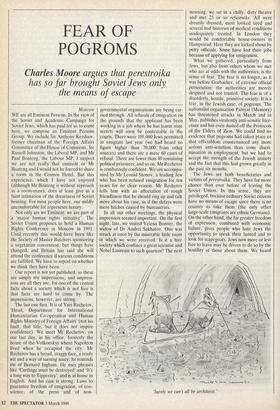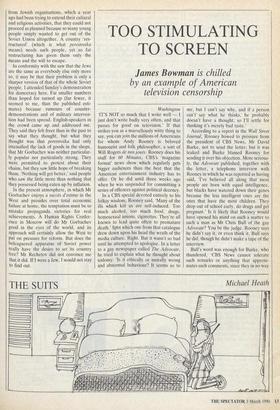FEAR OF POGROMS
Charles Moore argues that perestroika
has so far brought Soviet Jews only the means of escape
Moscow WE are all Eminent Persons. In the view of the Soviet and Academic Campaign for Soviet Jews, which has paid for us to come here, we compose an Eminent Persons Group. We include Sir Anthony Kershaw, former chairman of the Foreign Affairs Committee of the House of Commons, Sir Russell Johnston, the Liberal MP, and Mr Paul Boateng, the Labour MP. I suspect we are not really that eminent or Mr Boateng and I would not be forced to share a room in the Cosmos Hotel. But this experience, which I have not enjoyed (although Mr Boateng is without reproach as a room-mate), does at least give us a faint intimation of the dreariness of Soviet housing. For most people here, our mildly uncomfortable lot represents luxury.
Not only are we Eminent: we are part of a 'major human rights initiative'. The Soviet Union proposes to hold a Human Rights Conference in Moscow in 1991. Until recently this would have been like the Society of Master Butchers sponsoring a vegetarian convention, but things have changed, and Britain has said she will attend the conference if various conditions are fulfilled. We have to report on whether we think they have been. Our report is not yet published, so these are simply my impressions, and impress- ions are all they are, for one of the central facts about a society which is not free is that facts are hard to come by. The impressions, however, are strong.
The last one first. It is of Yuri Rechetov, 'Head, Department for International Humanitarian Co-operation and Human Rights Ministry of Foreign Affairs' (not his fault, that title, but it does not inspire confidence). We meet Mr Rechetov, on our last day, in his office, formerly the house of the Volkonskys where Napoleon lived when he occupied the city. Mr Rechetov has a broad, craggy face, a ready wit and a way of turning nasty: he reminds me of Bernard Ingham. He uses phrases like 'Carthage must be destroyed' and 'It's a long way to Tipperary', and is at home in English. And his case is strong. Laws to guarantee freedom of emigration, of con- science, of the press and of non-
governmental organisations are being car- ried through. All refusals of emigration on the grounds that the applicant has been working in a job where he has learnt state secrets will soon be contestable in the courts. There were 105,000 Jews permitted to emigrate last year (we had heard no figure higher than 70,000 from other sources) and there are a mere 60 cases of refusal. There are fewer than 40 remaining political prisoners; and so on. Mr Rechetov is combatively confident. We are accompa- nied by Mr Leonid Stonov, a leading Jew who has been refused emigration for ten years for no clear reason. Mr Rechetov tells him with an affectation of rough friendliness that he should ring up and talk more about his case, as if the delays were mere hitches caused by bureaucrats.
In all our other meetings, the physical impression seemed important. On the first night, late, we visited Yelena Bonner, the • widow of Dr Andrei Sakharov. One was struck at once by the miserable little room in which we were received. Is it a free society which confines a great scientist and Nobel Laureate to such quarters? The next morning, we sat in a chilly, dirty theatre and met 25 or so refuseniks. All were drearily dressed, most looked tired and several had histories of medical conditions inadequately treated. In London they would be comfortable house-owners in Hampstead. Here they are kicked about by petty officials. Some have lost their jobs because of applying for emigration.
What we gathered, particularly from Jews, but also from others whom we met who are at odds with the authorities, is the sense of fear. The fear is no longer, as it was before Gorbachev, of extreme official persecution: the authorities are merely despised and not trusted. The fear is of a disorderly, hostile, primitive society. It is a fear, in the Jewish case, of pogroms. The nationalist organisation Parnyat (Memory) has threatened attacks in March and in May, publishes virulently anti-semitic liter- ature and has even dusted off the Protocols of the Elders of Zion. We could find no evidence that pogroms had taken place or that officialdom countenanced any more serious anti-semitism than some discri- mination in employment, but we had to accept the strength of the Jewish anxiety and the fact that this had grown greatly in the past six months.
The Jews are both beneficiaries and victims of perestroika. They have far more chance than ever before of leaving the Soviet Union. In this sense, they are privileged, because ordinary, Soviet citizens have no means of escape since there is no country to take them (the only other large-scale emigrants are ethnic Germans). On the other hand, the far greater freedom of expression, combined with economic failure, gives people who hate Jews the opportunity to speak their hatred and to look for scapegoats. Jews noW more or less free to leave may be driven to do so by the hostility of those about them. We heard 'Surely we can't all be architects.'
from Jewish organisations, which a year ago had been trying to extend their cultural and religious activities, that they could not proceed as planned because so many young people simply wanted to get out of the Soviet Union altogether. A country 'res- tructured' (which is what perestroika means) needs such people, yet so far restructuring has given them only the means and the will to escape.
In conformity with the saw that the Jews are the same as everybody else only more so, it may be that their problem is only a sharper version of that of the whole Soviet people. I attended Sunday's demonstration for democracy here. Far smaller numbers than hoped for turned up (far fewer, it seemed to me, than the published esti- mates) because rumours of counter- demonstrations and of military interiren- tion had been spread. English-speakers in the crowd came up and addressed me. They said they felt freer than in the past to say what they thought, but what they thought was that perestroika had only intensified tile lack of goods in the shops, that Mr Gorbachev was neither particular- ly popular nor particularly strong. They were permitted to protest about their chains, but they saw little hope of breaking them. `Nothing will get better,' said people who saw the little more than nothing that they possessed being eaten up by inflation.
In the present atmosphere, in which Mr Gorbachev enjoys a succes d'estime in the West and presides over total economic failure at home, the temptation must be to mistake propaganda victories for real achievements. A Human Rights Confer- ence in Moscow will do Mr Gorbachev good in the eyes of the world, and its approach will certainly allow the West to Put on pressure for reform. But does the beleaguered apparatus of Soviet power really have the desire to set its country free? Mr Rechetov did not convince me that it did. If I were a Jew, I would not stay to find out.



























































 Previous page
Previous page